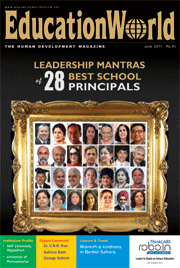 I read your latest issue featuring the ‘Leadership mantras of 28 best school principals’ (EW June) with rapt interest. I am in complete sympathy with the view expressed in your ‘Letter from the editor’ that the task of leading an educational instit-ution is more complex than of running a company or busi-ness organisation.
I read your latest issue featuring the ‘Leadership mantras of 28 best school principals’ (EW June) with rapt interest. I am in complete sympathy with the view expressed in your ‘Letter from the editor’ that the task of leading an educational instit-ution is more complex than of running a company or busi-ness organisation.
The reality is that as heads of school we deal with human beings from the age of six-86 years including children, teachers, parents and grandparents. More challenging is the fact that Indian society is in a flux, and there is a great churning of values, ethics, and character happening everywhere — regrettably for the worse. Old patterns and stereotypes are changing, as are parents and their priorities which is adversely affecting the education of children.
Against this background, the role of teachers and principals has never been more important. We need to first get our own conduct and priorities right, so we can deliver value-based education to children under our care.
Praveen Vasisht, Headmaster
The Lawrence School, Sanawar
Elitist attitude charge
I was surprised, even shocked, to see that your June cover story featuring the leadership mantras of India’s 28 best school principals didn’t include even one government school principal. Does this mean that India’s best principals are to be found only in elite private day, boarding and international schools?
The reality is there are hundreds of government school principals, partic-ularly in the rural hinterland working in very difficult conditions to deliver quality education. Real-life stories of how government school principals deal with the challenges of poor infrast-ructure, absentee teachers, and first generation learners would have proved more inspirational than the banal homilies mouthed by your selected principals working out of air-conditioned offices.
My advice: shed your elitist attitude and include government schools.
Sumita Ganguly
Kolkata
We repeatedly contacted T. Mrinalini, principal of Kendriya Vidyalaya, IIT-Madras campus — India’s top-ranked (No.50) gover-nment day school in the EW-C fore India’s Most Respected Sch-ools Survey 2010 — but she procrastinated beyond the deadline — Editor
Bang on target
I read with avid interest Dr. C.N.R. Rao’s prescriptions for rejuvenating Indian higher education (EW June). The distinguished scientist’s observation that India has an examinations rather than an education system, is bang on target. It’s not unusual for Plus Two students to write six-seven entrance exams in addition to their board exams.
This is cruel, to say the least. Dr. Rao’s suggestion of instituting a single national entrance exam for admission into all colleges countrywide is excellent, and needs to be implemented immediately. Moreover his other recommendations for revamping and upgrading Indian higher education need a nationwide debate.
Sunil Malhotra
Delhi
Managing census shock
Re the news story ‘China: One child policy revisionism?’ featured in the international news section (EW June), I’d like to draw your attention to the recently concluded Census 2011 of India. The latest data indicates that adult literacy has risen to 74 percent. However, if population growth is to be controlled, India needs nothing short of 100 percent literacy. Universal literacy will help lower the annual birth rate.
Most of India’s problems are rooted in overpopulation. The government should consider providing incentives for people to have fewer children. It could, for example, reward couples who choose to adopt instead of having children of their own. An added advantage would be that many abandoned and orphaned children across the country will find homes.
Mahesh Kapasi
Delhi
The DPS formula
I disagree with the viewpoint expressed by Parwez Samuel Kaul (Mailbox, EW May) attributing the success of DPS schools to their “conn-ections with the high and mighty in government”. On the contrary, the name and fame of DPS is due to excellent administration, academic accomplishments and provision of a wide range of co-curricular activities with state-of-the-art facilities.
The common objective of DPS institutions is to provide students with new technologies-aided education rooted in traditional Indian values and ethics. The motto ‘Service before self’ is practiced by all teachers of the DPS fraternity.
Sunita Tanwar, Principal
Delhi Public School, Dwarka
Without prejudice
I read your revealing cover story on Azim Premji’s ‘Exemplary gift to Indian education’ (EW May) and your ‘Letter from the editor’ in the same issue, with great interest. From the latter it’s quite evident there’s no love lost between you and Premji. You seem to be bitter that despite your long association and “commonality of objectives”, this Bangalore-based billionaire failed to extend a helping hand to Education-World when you most needed it.
I am surprised that as former editor of Business India and Businessworld you were unaware of the widespread practice of leaders of Indian industry extending a helping hand only to those who don’t need it — to offer an umbrella when the sun is shining. The leaders of India Inc have little time or patience with those who really need help and support. For instance, it’s quite common for Indian business tycoons to run private jets and throw lavish parties, but keep their suppliers and component manufact-urers’ bills pending for months on end.
Meanwhile you have succeeded in your effort to “block out personal equations and prejudices” while writing your illuminating story on the Azim Premji University. Indeed there is nothing but praise and wholesome support for Premji’s exemplary initiative which will surely transform the education landscape of this country.
Congratulations on a job well done!
Prateek Biswas
Kolkata